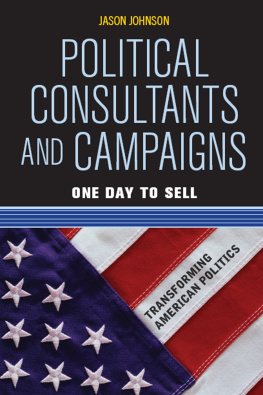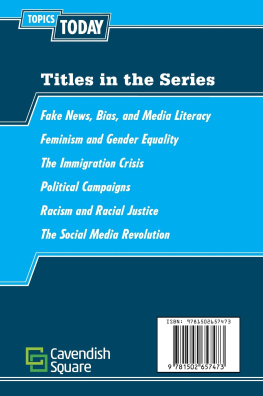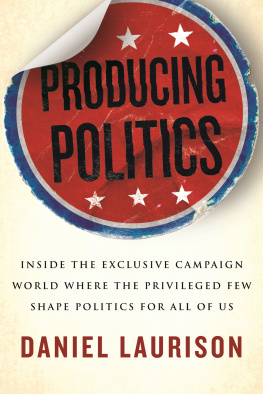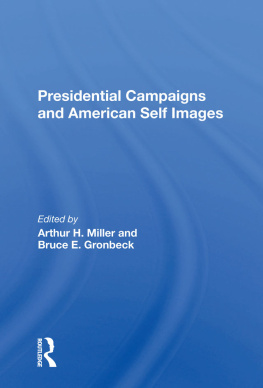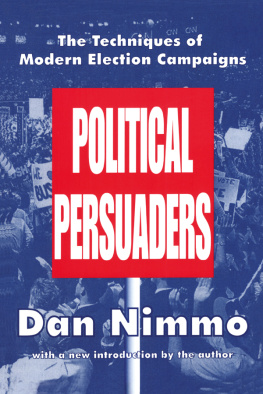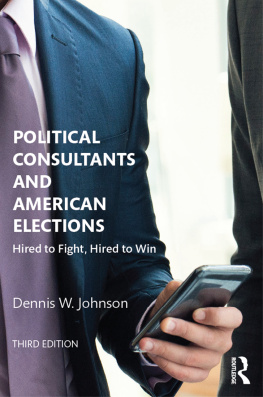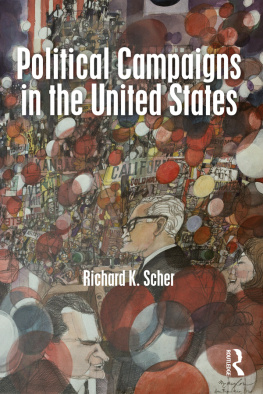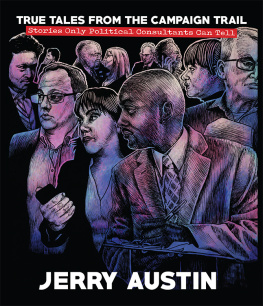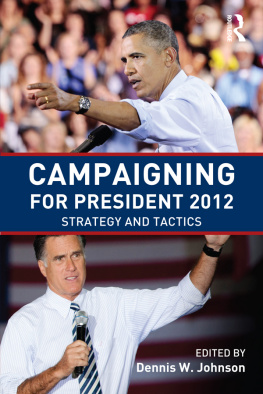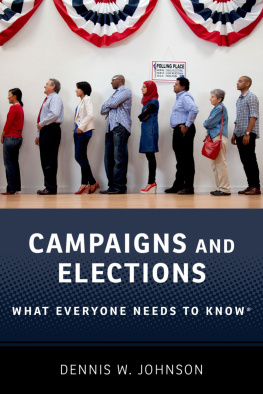Political Consultants and Campaigns
TRANSFORMING AMERICAN POLITICS
Lawrence C. Dodd, Series Editor
Dramatic changes in political institutions and behavior over the past three decades have underscored the dynamic nature of American politics, confronting political scientists with a new and pressing intellectual agenda. The pioneering work of early postwar scholars, while laying a firm empirical foundation for contemporary scholarship, failed to consider how American politics might change or recognize the forces that would make fundamental change inevitable. In reassessing the static interpretations fostered by these classic studies, political scientists are now examining the underlying dynamics that generate transformational change.
Transforming American Politics brings together texts that address four closely related aspects of change. A first concern is documenting and explaining recent changes in American politicsin institutions, processes, behavior, and policymaking. A second is reinterpreting classic studies and theories to provide a more accurate perspective on postwar politics. The series will look at historical change to identify recurring patterns of political transformation with in and across the distinctive eras of American politics. Last and perhaps most important, the series presents new theories and interpretations that explain the dynamic processes at work and thus clarify the direction of contemporary politics. All of the books focus on the central theme of transformationtransformation in both the conduct of American politics and in the way we study and understand its many aspects.
BOOKS IN THIS SERIES
Political Consultants and Campaigns, Jason Johnson
Republican Ascendancy in Southern US House Elections, Seth C. McKee
Campaigns and Elections American Style, Third Edition, edited by James A. Thurber and Candice J. Nelson
American Voter Turnout: An Institutional Approach, David Lee Hill
Revolving Gridlock, Second Edition, David W. Brady and Craig Volden
The Congressional Experience, Third Edition, David E. Price
The Parties Respond, Fourth Edition, edited by L. Sandy Maisel
Diverging Parties, Jeffrey M. Stonecash, Mark Brewer, and Mack Mariani
Votes, Money, and the Clinton Impeachment, Irwin Morris
Class and Party in American Politics, Jeffrey M. Stonecash
Congress and the Decline of Public Trust, edited by Joseph Cooper
Public Opinion in America, Second Edition, James A. Stimson
Still Seeing Red, John Kenneth White
Masters of the House, edited by Roger H. Davidson, Susan Webb Hammond, and Raymond W. Smock
Governing Partners, Russell L. Hanson
Governance and the Changing American States, David M. Hedge
The Collapse of the Democratic Presidential Majority, David G. Lawrence
The Divided Democrats, William G. Mayer
Extraordinary Politics, Charles C. Euchner
The Irony of Reform, G. Calvin Mackenzie
Broken Contract, Stephen C. Craig
Young versus Old, Susan A. MacManus
The New American Politics, Bryan D. Jones
Bureaucratic Dynamics, B. Dan Wood and Richard W. Waterman
The Dynamics of American Politics, Lawrence C. Dodd and Calvin Jillson
The Politics of Interest: Interest Groups Transformed, edited by Mark P. Petracca
First published 2012 by Westview Press
Published 2018 by Routledge
711 Third Avenue, New York, NY 10017, USA
2 Park Square, Milton Park, Abingdon, Oxon OX14 4RN
Routledge is an imprint of the Taylor & Francis Group, an informa business
Copyright 2012 Taylor & Francis
All rights reserved. No part of this book may be reprinted or reproduced or utilised in any form or by any electronic, mechanical, or other means, now known or hereafter invented, including photocopying and recording, or in any information storage or retrieval system, without permission in writing from the publishers.
Notice:
Product or corporate names may be trademarks or registered trademarks, and are used only for identification and explanation without intent to infringe.
Every effort has been made to secure required permissions for all text, images, maps, and other art reprinted in this volume.
Library of Congress Cataloging-in-Publication Data
Johnson, Jason.
Political consultants and campaigns : one day to sell / Jason Johnson.
p. cm. (Transforming American politics)
Includes bibliographical references and index.
ISBN 978-0-8133-4488-1 (pbk. : alk. paper) ISBN 978-0-8133-4556-7 (e-book)
1. Political consultantsUnited States. 2. Political campaignsUnited States. 3. Campaign managementUnited States. I. Title.
JK2281.J627 2011
324.70973dc22
2011004728
ISBN 13: 978-0-8133-4488-1 (pbk)
American elections are one of the most studied and analyzed areas in political science. Arguably, everything from the behavior of mayors, congressmen, and presidents to the implementation of policy at all levels of government is influenced by political campaigns (Mayhew 1974; Randon Hershey 1984; Johnson-Cartee and Copeland 1997; Thurber, Nelson, and Dulio 2000; Nelson, Dulio, and Medvic 2002; Sabato 2006). However, all too often, election research proposes theories, reaches conclusions, and leaves campaign managers, consultants, and organizersactual political professionalsout of the equation. This is akin to seeing a group of well-dressed, high-minded art critics crowded around a painting and discussing its implications, all the while ignoring the artist who is standing right next to the work. At the same time, many political professionals believe that academic theory comes from men and women locked away in ivory towers and that it has no place in the real world of political campaigns (Johnson-Cartee and Copeland 1997; Thurber 1998a; Jamieson and Waldman 2001; Craig 2006).
The goal of this book is to bridge the gap between these two groups, to find out where political science theory and political professionals agree and where they disagree. The hope is that this research will not only teach us more about campaign managers and political professionals but also give us more insight into how exactly political science theory can be helped or improved by consistently including the men and women pulling the strings in American politics. In order to show where this book will take political science research on campaign managers, it is first necessary to explain where the research has been.
The Personal Era, 19501970
Although there have always been men and women involved in running political campaigns, there was very little political science research on political managers until fairly recently. The first era of work on campaign professionals is best described as sporadic and personal. The advent of modern polling technology in the 1950s, and dynamic innovations in campaign strategy (demonstrated in John F. Kennedys presidential campaign in 1960), brought about more sophisticated discussions of American elections in political science, but work on actual campaign managers was still fairly sparse. or oral histories collected for archives and journalists (Shadegg 1964; Kirwan and Redding 1964; Scott 1968). The principals of Baus and Ross, one of the first fully functioning political consulting firms in America, put together a how-to book for budding political campaigners that hinted at overarching campaign theories without explicitly stating any. Baus and Ross wrote, Forcing the issue transcends merely debating acknowledged issues. The winning offensive strategy is to convince the voters that the issue is what the winner says it is, not what his opponents say it is. The winner forces the loser to fight on terrain of the winners choosing (1968, 120). While Baus and Ross hinted at issue positioning strategy, they did not go so far as to suggest how this might apply across various types of elections. The majority of the work in this era either by consultants or by academics spoke little to campaign strategy beyond the particular races individuals ran, and there was little or no work done on the profession in general. Campaign managers were an afterthought in political science research on campaigns, and campaign managers themselves seldom referenced political science in their musings.

